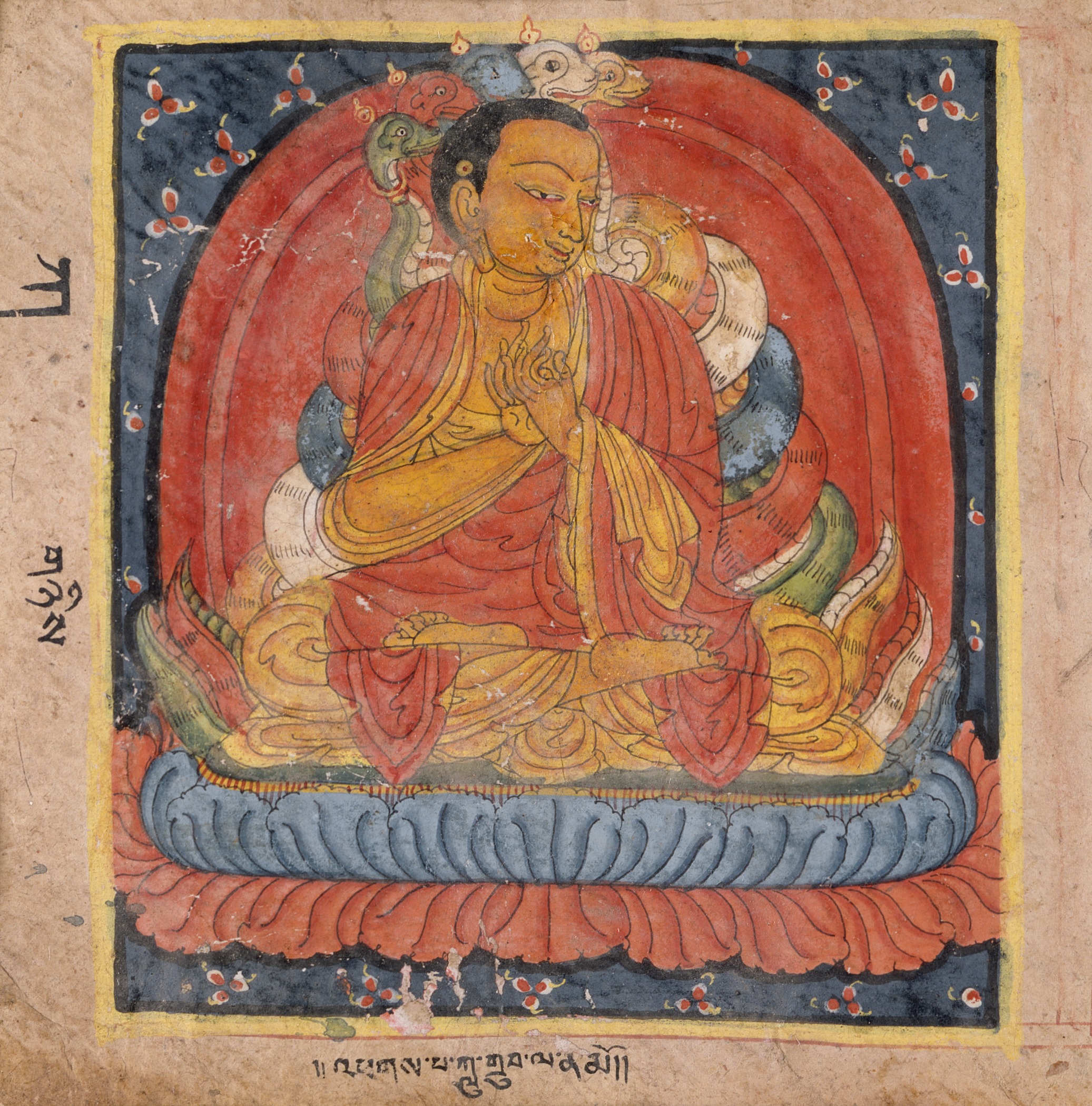Hi, this is geshe Michael Roach, welcome back to the Lam Rim (LAM RIM). We’ve been talking about—you know we’re in the Steps of the Path for people of medium capacity and our goal is to get out of the Wheel of Life. In this level, the second level, the goal is to get out of the wheel of life, reach nirvana, a personal nirvana, just for ourselves, and the method is to practice those three—they’re called the Three Extraordinary Trainings. These are (1) being nice to other people, (2) learning how to meditate or focus, and then (3) mastering wisdom—understanding emptiness.
And if you remember, Pabongka Rinpoche said getting perfect meditation and understanding emptiness, these are kind of big things you have to have specialized help, you’ve got to work on them specially. But this one, being nice to other people, it’s always right there in your hands. It’s always available to you. You just have to do it. So no matter where you are, no matter who you are with you can practice this training. You don’t need to have a meditation studio. You don’t have to have the Perfection of Wisdom sutras. To be nice to other people you just have to be there. So we talked about three ways of not being nice to other people, or three things that might hurt your attempt to be nice to other people. So there are three different things that might happen to stop you from being nice to other people.
The first one is that (1) you don’t know the guidelines for being nice. No one ever told you the guidelines for being a nice person. You can say the ten basic good deeds. These are nice guidelines. So at least you should know those ten. Or maybe you’ve gone deeper and taken lifetime layman’s vows, or layperson’s vows, which we should all do. At least that. And then if you want to go deeper and you want to get more committed than become a monk or a nun. So the first way to get in trouble is if you don’t know what your vows are. No one ever told you what your vows are. And we said that particularly in the diamond way, particularly in the teachings which are meant to take you to enlightenment in one lifetime, particularly those teachings depend on knowing the vows and keeping the vows. So if you ever take an initiation or an empowerment you should demand to be taught the vows. And that takes some time. That’s going to take at least, I don’t know, four or five days. Ideally it would take four or five weeks to teach you those vows correctly. Otherwise, you should not take an empowerment.
So either you don’t know the vows, or the second possibility for breaking them, is that (2) they just don’t sound very important to you. “Like I understand I shouldn’t kill people; and I understand I shouldn’t steal things, but just talking about the president of the country when he is being weird?” “That’s not on the same level as killing people or stealing things.” “That’s not such a big deal.” So this kind of attitude where you say nang chung (MNANGS CHUNG). nang chung (MNANGS CHUNG) right? The idiom is nang chung (MNANGS CHUNG). You say “ah, that’s not so important”. “I’m doing okay.” “I’m not going to kill anybody.” “I’m not going to steal anything.” “But having a glass of wine once in a while or sitting around and talking about politicians, that’s okay.” “That’s not such a big deal.” So that kind of attitude where you decide unilaterally that the Buddha was being too strict. And the Buddha was micromanaging you. “These morals are not very important.” So that’s the second possibility for breaking your vows.
[su_icon icon=”icon: link” color=”#ff1259″ size=”20″ shape_size=”12″ url=”https://youtu.be/2xvzaZdtOdI?t=4m28s” target=”blank”]Video[/su_icon]The third possibility is what we’re getting in today, in episode six, and I like to call this episode “How to Run a Gang Fight”. Tim was asking me, “What! What?” I said “well, if you’re going to have a gang fight, there’s a certain way to run a gang fight”. There are certain standard operating procedures for running a gang fight and you should know them so you can have a good gang fight. And that involves the third of the three ways that you could get into the habit of breaking your commitments, your commitments to be nice to other people. Let’s start reading them at number three.
(NYON MONGS MANG BA’ANG LTUNG BA ‘BYUNG BA’I SGO YIN PAS, NYON MONGS ‘DOD CHAGS ZHE SDANG SOGS GANG SHAS CHE BA DE LA BRTEN NAS LTUNG BA’ANG DE’I RJES SU ‘BRANG BAR ‘GYUR) The third condition that’s going to make it more likely for you to break your commitments to be good to other people is called (NYON MONGS MANG BA’ANG). And that means a lot of negative thoughts in your mind. I don’t know about you but if I don’t get enough sleep, or I didn’t get breakfast, or I’m tired, then I tend to get angry easier. I tend to get more sarcastic with people. Things like that. (‘BYUNG BA’I SGO YIN PAS, NYON MONGS ‘DOD CHAGS ZHE SDANG SOG). All those negative thoughts in general can be categorized into three groups, right? It’s the three animals in the center of the Wheel of Life.
(‘DOD CHAGS) means “ignorant liking things”. Liking things the wrong way. Where you would hurt someone to get something is called (‘DOD CHAGS). What is it in the Wheel of Life? Which animal? The rooster. And in the old days it was a ..? A pigeon. Both of those birds are supposed to enjoy sex. I don’t know. I haven’t checked it out. They represent being willing to hurt someone else to get the things you like. It’s not wrong to like things. It’s fine to like cinnamon rolls, for example. If you want a cinnamon roll, the best one in the world is at the Peach Tree Cafe in Rimrock Arizona. Paris is number two. Rim Rock is number one. It’s not wrong to fly specially to Rimrock to get a cinnamon roll. But it is wrong to hurt someone to do that. To steal the money or something like that. Then that becomes a wrong thing.
(ZHE SDANG) means the opposite. In the Wheel of Life, anger is? The snake. Yeah. The snake in the center of the Wheel of Life represents getting upset. You can say getting upset. Or disliking things for the wrong reasons. So is it okay to dislike eggplant? I say yes. I don’t care about French cooking. What do you call it? Aubergine? Aubergine. Doesn’t matter. Poop by any other name is the same. Aubergine. What’s it called in Middle Eastern cooking, I forget. Baba ganoush. Yeah, anyway, it sucks no matter what name you give it. Oops. I’m not supposed to use that language. Anyways, it’s not wrong to dislike eggplant. You should dislike eggplant. But it’s wrong to hurt someone who serves you eggplant. You complain and you hurt them. That becomes wrong disliking. So he lists those two.
What’s the third one he didn’t mention? It’s the pig in the middle. And good drawings of the Wheel of Life had the snake and the rooster in the pig’s mouth. The tails are in the pig’s mouth meaning you misunderstand. You misunderstand things in the kitchen. You misunderstand the concept of two husbands and you get upset. So really that misunderstanding—to think that your husband is criticizing you because of something he did or that he wants to do is going to cause you to have those other two—we can say mental afflictions or negative emotions.
[su_icon icon=”icon: link” color=”#ff1259″ size=”20″ shape_size=”12″ url=”https://youtu.be/2xvzaZdtOdI?t=9m25s” target=”blank”]Video[/su_icon](GANG SHAS CHE BA) Here’s the gang fight! (GANG SHAS CHE BA) means you have to look into your personality and see which one is dominant. Which one predominates in your personality? Are you more likely to get upset during the day? Or are you more likely to overeat during the day? They asked me to do a yoga demonstration today but I was like, “but I still have my COVID tummy”. Veronica said I should buy a girdle. I don’t know. You have to decide in your personality which is the strongest type of negative emotion, which one tends to come up in you the biggest. Now, why does that relate to a gang fight? For fifty dollars! She raised her hand first. Twenty five, twenty five, okay? But tell somebody, okay? Tell somebody. Tell somebody to pay you guys. Okay.
When you have a gang fight, say you have twenty guys on one side and twenty guys on the other side—I was actually in one gang fight in my life. Me and my brother and all his friends, we decided we were going to stop this other gang. I remember, we did it on the school grounds. We told them to meet us at the school grounds at 4 o’clock and they brought 20 guys and we brought 20 guys. Everybody had sticks. We were going to have a big gang fight. This is when I was maybe sixteen or something? And this guy, the head of the other gang, came over to my gang and he said, “who’s in charge here?” We all said, “my big brother”. His name is Jeff. We said, “Jeff’s in charge here”. And the guy went BOOM and he knocked him down. He didn’t say anything, he just hit him as hard as he could in the face. And then we’re all like, “Okay, we give up!” And that was the end of the gang fight. So this is how to stop a gang fight. This is how to win a gang fight. Pabongka Rinpoche, what he’s saying here is go after your biggest one. Go after the head of the gang of negative emotions in your heart. Figure out which one is the main one and attack that one first. And then start with the second one. And then start the third one. But hit the worst one really hard first.

(DE LA BRTEN NAS LTUNG BA’ANG DE’I RJES SU) Then the other ones will follow. What he says here by the way is that breaking your vows tends to follow the same priority as the negative emotions you tend to feel more often. And we have here in the picture, a gang fight. So always go after the biggest guy on the other side. Go after the boss on the other side. (DGRA MGO GNON PA NA, DPA’ BO DMAG DPON SOGS GANG SHUGS CHE BA DE SNGON LA BTUL DGOS). He says, if you want to defeat a normal enemy, whether it’s a group of (DPA’ BO DMAG DPON) means you’re in a war. Or you’re in a gang fight. Go after the head of the other group. (GANG SHAS CHE BA) If you’re in a war then attack the strongest regiment on the other side. Because if you defeat the strongest group on the other side the rest of the groups will give up. So try to identify in your own heart which negative emotion tends to get more strong and go after your biggest one first. (DGOS PA LTAR, GANG MGO MTHO BA’I RANG RGYUD KYI NYON MONGS) Look for the negative emotion that’s standing “head over shoulders”, meaning the one who’s the biggest against you in your own heart. (NYON MONGS PA DE DANG DE’I GNYEN PO BSTEN). (GNYEN PO BSTEN) means apply the appropriate antidote for the biggest one.
[su_icon icon=”icon: link” color=”#ff1259″ size=”20″ shape_size=”12″ url=”https://youtu.be/2xvzaZdtOdI?t=13m48s” target=”blank”]Video[/su_icon]Now he gives specific negative emotions and he makes suggestions about the antidotes. He’s not going to cover the 84,000 negative emotions that are possible, but he’s going to do four or five. He seems to be saying, “look I know you’re in there somewhere”, you know, talking to us, right? I’ll cover the four or five big kleśas, big negative emotions, and I think we’re going to find yours in there. So listen up. We’re going to list five and I’ll give you suggestions for their antidotes, for their respective antidotes. He starts with (‘DOD CHAGS DE YANG ‘DOD CHAGS SHAS CHE BA LA). (SHAS CHE BA) means “dominant in your personality”. If your personality tends more to attraction to the objects of the senses, for example. Sex. Pornography. Food. Alcohol. Smoking. Things like that. If you’re more attracted to physical objects of the senses then you should be doing (MI SDUG PA BSGOM PA). (MI SDUG PA BSGOM PA) means “meditation on the disgusting”. “Disgusting meditation”. And a typical object that you can take—oh, he makes a list here. He’s probably talking about a case where we can’t take our eyes off other women or other men. So maybe we already have a partner, but we keep staring at other people’s partners, or somebody other than our partner. And if that’s your problem, he says—in the short run, okay.

Emptiness is obviously the greatest antidote, but for a short-term antidote (LUS MI GTZANG BA’I RKYAL PA). (RKYAL PA) means a bag. Like a big grocery bag. (MI GTZANG BA’I) means poo poo. Try and look at the other guy’s wife or the other woman and try to imagine that she’s a big bag of poo poo. I got you a picture here—this is very commonly used, this kind of picture is very commonly used in these discussions. This is an actual person. They have cut open the person’s body. And this is what those sexy women look like on the inside. Or a sexy man. We don’t even know if this is a man or a woman because on the inside everybody looks the same. It’s just disgusting and terrifying. A bag of poop. Mostly poop moving through the body. If you have trouble with desire for the human body, keep one of these pictures with you and pull it out when you can’t stop looking at somebody. You men out there who have a pornography addiction which I think 80% do. Then pull out the picture and say that’s what she really looks like on the inside. And if you spend enough time with somebody inevitably you’re going to see this. There’s no person who’s so beautiful or attractive that sooner or later you don’t see the real nature of the human body. Inside. If love is based on the body then love is going to fail. Okay?
[su_icon icon=”icon: link” color=”#ff1259″ size=”20″ shape_size=”12″ url=”https://youtu.be/2xvzaZdtOdI?t=17m33s” target=”blank”]Video[/su_icon](RKYAL PA YIN) Or (RNAM PAR DMAR BA) means this whole inside is—(RNAM PAR DMAR BA) means “totally red”. Covered with crimson blood. Take that—what do you call it? What’s that complexion—makeup company? Estée Lauder. Face. And peel off the skin and take a look. It’s all red rotten meat. With blood. That’s called (RNAM PAR DMAR BA). It’s a kind of meditation actually. OR, (RNAM PAR BAM PA) I don’t remember what’s (BAM PA), but I think it means rotten. (‘BUS GZHIG PA) means there are bacteria and other small creatures living inside our bodies, in our intestines, and when we die they just eat our body. It can also mean worms. Worms will be eating your body. (RUS GONG GI ‘DU SHES) means that it can be useful, if you’re attracted to a woman or a man of another person’s relationship, just look at them as bones. Look at the outline of their bones on their body and strip off the meat mentally and see the arm as a bone. Would you feel like having sex if you could see the bone hanging out? I have a friend who lost her leg recently. It was amputated and you see the bone and you’re like, “Okay, not so sexy. Scary.” Very mortal. Okay, there he gave us attraction to the physical senses, and then the antidote is to look under the skin, peel off the skin and look at the real person there.
[su_icon icon=”icon: link” color=”#ff1259″ size=”20″ shape_size=”12″ url=”https://youtu.be/2xvzaZdtOdI?t=19m41s” target=”blank”]Video[/su_icon]
Next we have (zhe sdang). If you have a problem with anger or disliking people—his antidote is two syllables. (BYAMS PA). Use (BYAMS PA). (ZHE SDANG GI GNYEN POR BYAMS PA) Use (BYAMS PA). (BYAMS PA) means what? Love. Love. And the classic example of (BYAMS PA) is a child. Offering a child a birthday present. You can see the picture here and the child has just been handed a birthday present. That kind of look on the child’s face—she’s got a birthday present in her hands. Just that look, just that look on a face of a child, it’s a high Buddhist principle, meaning enjoy it when other people are having fun and enjoy it when other people are having a good time. That’s called (BYAMS PA). Maitri. And that’s where Maitreya comes from. It means love. Love means, “I’m so happy that you’re happy”.
[su_icon icon=”icon: link” color=”#ff1259″ size=”20″ shape_size=”12″ url=”https://youtu.be/2xvzaZdtOdI?t=20m59s” target=”blank”]Video[/su_icon]Now he moves on to (NGA RGYAL) which is kind of my specialty. (NGA RGYAL) means “I am king” and it’s the ancient word for pride or you’re absorbed—egotism. I’m the best teacher. I know the most languages et cetera, et cetera. I’m the most beautiful. (NGA RGYAL). (NGA RGYAL GYI GNYEN POR) If you want to fix it, this feeling of conceit or pride (NA RGA ‘CHI) think about how inevitably your body will collapse. Your mind will start to get slower and slower. We went to visit an old person yesterday. She’s 95. And we called her. We said, “we’ll be there tomorrow”. “Okay”. Then we called her the next morning. We said “we’re gonna leave soon” and she said “why?” And I said “we’re coming to see you. Remember? We called yesterday”. “Oh, okay, okay”. Then we’re half an hour away and we called and said “don’t forget we’re going to be there in half an hour”. “Okay, okay”. And then 15 minutes later we called again. “We’re coming”. She said, “what? Why are you coming?” “Because we’re coming to see you”. Finally, we got to her assisted living place and she came down to talk through the window and she forgot her hearing aid. So we couldn’t talk. And we drove for four hours to talk to her. And she’s like, “oh, I forgot my hearing aid”. It will happen to us. We will be there also. Maybe. Hopefully somebody will come visit us no matter how stupid we got.
(NA RGA ‘CHI) Sickness. Aging. Death. That’s three of the classic sufferings. So what’s the other one? dump pum pum pum … Huh? (SKYE RGA NA ‘CHI). I should give you $20. Give yourself $20. Birth. (SKYE). He didn’t list birth here. And that’s mmmm. I don’t know why. (NGES PA MED PA) He starts to list the classic problems with life. We already learned this list, especially from, I think, the First Panchen Lama. The list of problems of the human realm. (NGES PA MED PA) means “there’s no certainty about anything”. You think you’re finally set, you think things are finally going well, and then they change again. We’re just not sure. I think it’s strongly obvious right now. Me and my friends we kinda stopped talking about the virus. Somebody said, “you know what?” And we all said, “What?” And they said, “nobody knows, in this world, what’s going to happen. Nobody knows”. So stop talking about it all day. We don’t know in six months what’s going to happen. We don’t know in one year. Nobody knows. So that’s called (NGES PA MED PA). And it’s always been like that
[su_icon icon=”icon: link” color=”#ff1259″ size=”20″ shape_size=”12″ url=”https://youtu.be/2xvzaZdtOdI?t=24m17s” target=”blank”]Video[/su_icon](YANG YANG MTHO DMAN DU ‘GYUR BA’I NYES PA) Every time we seem to get a position, every time we seem to be in someone’s favour, We drop. Then we drop again. And we keep going up and down up and down. Et cetera. He says “et cetera”. He says if you’re interested in those other human sufferings you go back and read that part. Then he starts to list all the things we don’t know. Oftentimes in the monastery, pride would be directed at how many scriptures you know, or how good your philosophy is, or how you can debate. He says (KHAMS KYI RAB DBYE BSAM STE) This is where we have a picture—I call it “stars over the ocean”. Our life is like we are looking at the top of the ocean but we can’t see what’s under the ocean and we can’t see what’s in the sky. If you think about what percentage of the universe we know it’s like point zero zero zero zero zero one. So, why do you feel you’re so knowledgeable about Buddhism when you don’t have any clue about ninety percent of the stuff. 99.999 percent of the stuff that exists in the universe you have no clue about. Just look at the stars at night. Look at the top of the ocean and think about what’s under there. You have no idea. You really have no idea.

(BSAM STE, DE LA RE ZHIG RANG LUS LA’ANG PHUNG PO DANG KHAMS DANG, SKYE MCHED DANG) There are even parts within us—parts of our psychology, parts of our character, parts of our physical body that we have no clue about. You could have the COVID virus swimming around in your bloodstream right now. We don’t know. You are so ignorant about everything, so why do you feel so proud of your knowledge? (SKYE MCHED DANG, DBANG PO DANG LUS KYI ‘DUS TE REG PA SOGS LUS KYI ‘DUS TE REG PA) it’s a kind of (TSORWA), is a kind of feeling. If you want to know about that one talk to Sugeng Shi who is translating the extensive Wheel of Life literature. It refers to physical feelings that we have that are triggered through the medium of our skin. (LUS KYI ‘DUS TE REG PA SOGS RANG NYID KYIS PHYOGS TZAM YANG MI SHES PA) You have no clue about 99% of the stuff in the universe. (MANG PO YOD NA GZHAN CI SHES ZHES BSGOM PA DANG) What you don’t know is huge, what you do know is almost nothing.
[su_icon icon=”icon: link” color=”#ff1259″ size=”20″ shape_size=”12″ url=”https://youtu.be/2xvzaZdtOdI?t=27m25s” target=”blank”]Video[/su_icon]The next negative emotion—and don’t forget we’re studying them because it’s the third way to break your vows. If you get stirred up by your negative emotions, you’re going to steal something. You’re going to say something bad. You’re going to chase someone else’s partner. (GTI MUG GI GNYEN POR RTEN ‘BREL DANG, NYON MONGS SPYI’I GNYEN POR STONG NYID KYI LTA BA BSGOM) Here he talks about (GTI MUG), which is the technical name for the pig in the middle of the Wheel of Life. It’s called “dark ignorance”, a special kind of ignorance. The antidote for that is to understand seeds in the mind. Generally, the all-purpose antidote to all of these negativities is to understand the “two husbands in the kitchen”. If you don’t know what I’m talking about, ask somebody else. If you want to know the best source for that, it’s Nagarjuna who you see in the picture here.

We call him THE Arya, meaning Mr. Emptiness. Really, if you get a chance, you have to read some Nagarjuna. Just listen to Nagarjuna for half an hour. It’s going to wipe out your ignorance. You’re misunderstanding. Master of emptiness. THE arya. THE emptiness master. We’re going to run over a little bit Tim. I’m sorry.
[su_icon icon=”icon: link” color=”#ff1259″ size=”20″ shape_size=”12″ url=”https://youtu.be/2xvzaZdtOdI?t=29m03s” target=”blank”]Video[/su_icon]Number four. Now he’s finished three different things that can make you break your commitments. (1) You don’t know them. (2) You don’t think they’re so important. (3) Or you’re having a lot of other mental problems at the same time. Now there’s a fourth one. The fourth one is (4) you are not keeping up a state of watchfulness, you are not watching the condition of your own mind. After 50 years of practicing Buddhism, I can say that you do get some warning signs just before you have a desire attack. Or just before you have an anger attack. There are warning signs. If you meditate probably 50 years you can start to notice them. Like, you start to obsess about somebody. You start to think about somebody. You start to think about what somebody said and there’s a period of about five or ten minutes or two hours of thinking about what somebody said to you, and then you get upset. So if you can maintain a high degree of awareness, they call it—what do they call that in the military? High degree—no, there’s a word for it. The analysts figured out there could be a nuclear war in the next 10 hours so everyone goes on a heightened alert—heightened alert state. Like alert state. Heightened security state. If you can stay alert and observe your own thoughts, your own emotions, if you can learn to do that then you won’t break your vows.
(RANG ‘GRO ‘CHAG NYAL ‘DUG) This is very, very famous. Please say (‘GRO). Sorry. (GRO. CHAG. NYAL. ‘DUG). It’s a funny thing. You’re having trouble keeping your vows? Ya. Okay. I just want you to watch your mind on four different occasions. That’s all. It’s not hard. Just watch your mind at four different periods during the day. Don’t worry about the rest. And then you’re like, “yeah. Okay. What’s the four?” Number one: if you’re in the car. Number two: if you’re traveling in any other way. By foot for example. Like across the room. If you’re walking across the room. Oh, and if you’re in bed sleeping. And if you’re sitting down. Just those four. Just cover those four. Don’t worry about the rest. It’s a Buddhist—it’s a Lord Buddha joke. Just watch your mind if you’re traveling far, or you’re walking across the room, or you’re sitting, or you’re sleeping. Don’t worry about the rest. It’s a joke.
It means, I don’t care where you are. 24 hours. You have to be in a heightened state of watchfulness so that you don’t have a negative emotion.(NYAL ‘DUG BZA’ BTUNG SOGS) Even when you’re eating. Even when you’re drinking. (SPYOD LAM GYI SKABS KUN TU) I don’t care what you’re doing. (BLANG DOR MI BRJED PA’I DRAN PA) Remember what’s good to do, and remember what’s not good to do. (‘PHRAL ‘PHRAL DU RANG GI SGO GSUM LA NYES LTUNG GIS GOS MA GOS BRTAG CING {last word here seems off}) Keep an eye every few minutes and check your mental state. Every few minutes check your mental state. Am I breaking any vows? (NYES LTUNG ‘BYUNG BA’I SGO RNAMS BKAG) Then you will block the door for mistakes to be made. Alright we got just a tiny bit to go. No, we got a bit to go. I’m sorry, this one’s longer.
(DRAN PA DANG SHES BZHIN DANG, NGO TSA SHES PA DANG, KHREL YOD PA’I SGO NAS) Use (SHES BZHIN), use the mental alarm which we talked about during meditation to detect that your mind is getting upset, or whatever. Desire. Then (DRAN PA) Pull back your guard mind. (NGO TSA SHES PA) Think how you want—think how you want to perceive yourself. I don’t want to be a bad person. I don’t care if anybody knows about it or not. But I for myself don’t want to be a bad person. And then (KHREL YOD PA) means think about what others would feel if they found out how you’re really feeling. (BRGYA LA GAL TE LTUNG BAS GOS PA). (BRGYA LA) is a funny word. Okay Seiji $100. (BRGYA LA). $100! C’mon! Tim, $101? Nope. Cancel that. It means “one in a hundred”. And it means that he’s being—the lama, Pabongka, he’s being, he’s being—what do you call it? He’s being respectful towards us. He says, if in the one chance out of a million that you’d get angry—yeah, he’s being polite to the audience. He is saying just in the one chance out of a million that you break one of your vows, then do your (GSO SBYONG).
Okay, get on your butt about (GSO SBYONG). Get your butt off the chair and do your (GSO SBYONG). Purify. Purify that mistake. (YANG YANG SONG NAS BSHAGS) and keep telling other people the mistake you made and that helps clean it. Don’t keep it to yourself. Tell somebody. Tell your dog. No tell another person, it’s more powerful. (‘DUL BA’I GZHUNG LAS LHAG MA SOGS SPO MGU DBYUNG GSUM GYIS BSHAGS DGOS PAR) Then he cuts us some slack. The next paragraph is slack cutting. He says look, you guys are all monks and nuns and according to the Vinaya scriptures—which we are translating in the Mixed Nuts. We read this already. You have three options. With confession. You have three classic options with confessions.
[su_icon icon=”icon: link” color=”#ff1259″ size=”20″ shape_size=”12″ url=”https://youtu.be/2xvzaZdtOdI?t=35m039s” target=”blank”]Video[/su_icon](SPO), (MGU), and (DBYUNG). And these are highly technical Vinaya terms that nobody would normally know. (1) (SPO) means if a monk or nun breaks a big vow they’re actually not allowed to sit with the other monks and nuns. They have to go sit in the back. That’s called (SPO). “Move them”. (2) (MGU) means “please—make somebody happy”. So what does that have to do with breaking a vow? Well after they (SPO) they have to wash dishes and clean toilets for like three weeks. Okay, that’s called make the normal dishwashers and toilet cleaners happy because they get a break and this monk who broke his vows has to wash the dishes and clean the toilets. Okay, then that makes the other monks happy who were supposed to do that.
Okay, so (1) move them and (2) please them. (3) (DBYUNG) means “throw them”. And usually it means throw somebody out of the monastery. It’s called (DBYUNG). But here’s a very interesting thing. It means after the monk has finished cleaning toilets or washing dishes for three weeks to make up for breaking the small vow, then “throw them” back into their high position. It’s very interesting. Encourage them, praise them. You’re so cool, you confessed. We made you wash dishes for three weeks. Now, look at you. You’re super pure! We’re gonna put you back up in the high position. It’s a cool balance. First you shame the guy and then you make him do dirty stuff for three weeks. And then you’re supposed to say, “look at this guy, he’s more pure than all of you”. He worked it off. And then the guys is like “ya, I’m the most pure now!”
He says, (SPO MGU DBYUNG). He says look, the Vinaya scriptures say you have to go through this process. But Wensapa—Wensapa lived 1525 to 1590. I looked it up. And his main disciples said “look, we know the technical stuff in Vinaya. We’re familiar with it. But, (‘GYOD SDOM LEGS PAR BYED NA) if you just take two steps, it’s enough”. Now Wensapa should know because Wensapa is lama who is famous in Tibet. If you say, “is there actually any Lama who got enlightened?” He’s famous in Tibet for being the one Lama who got enlightened in this lifetime by practicing. So it’s funny, in Tibet you’ve got thousands and thousands of practitioners, famous practitioners, but there’s one who they say “he did it. He really became enlightened in this lifetime”. He said, “look, just feel bad about breaking it and then make a commitment to control yourself in the future. Forget all the other Vinaya, (GSO SBYONG), blah blah blah. So here’s the one guy who supposedly became a Buddha, and he’s like look, (GSO SBYONG) is good. Confession ceremonies are good. Everything’s good.
[su_icon icon=”icon: link” color=”#ff1259″ size=”20″ shape_size=”12″ url=”https://youtu.be/2xvzaZdtOdI?t=39m15s” target=”blank”]Video[/su_icon]But if you just have a heartfelt feeling like “I messed up”, and then if you decide to control yourself in the future, you’re clean. (BYED NA LHAG MA MAN CHAD ‘DAG NUS PAR BZHED) We say we follow Wensapa. But they mentioned the word for second level monk’s vows. So there are four very serious monk’s vows and the implication here is that just that attitude is not enough to clean those four. If you break those four in a heavy way you actually lose your monk’s vows. So he’s saying the second level down, yeah,
you can clean it, but I’m not talking about the four main monk’s vows.
Okay, last part. (RANG RES MNYAM MED JO BO CHEN PO DANG, ‘JAM MGON TZONG KHA PA CHEN PO YAB SRAS SOGS LTAR TSUL KHRIMS CHA THAMS CAD NAS NYES PAS MA GOS PA’I BSRUNG SDOM BYED MI NUS KYANG) People like you and me, we’re not like Tsongkapa. We’re not like Lord Atisha. We can’t keep our vows. Those guys, they kept every little vow and they didn’t hurt a single flea in their whole life. And he says we’re not like that. We’re not like that. We’re normal people. We make mistakes. But minimum (GOS PA’I BSRUNG) means—what do you call it? At the cost of your life? At the risk of your life. If you have a choice between dying and keeping these five, keep these five. The rest of your vows, you can break them, you’re going to break them, you’re a human being. But please please please don’t break those big five.
What are the big five? Those are the components of the lifetime layman’s vows. (1) Do not kill a human or a human fetus. (2) Do not steal anything of value knowingly. (3) Don’t have sexual relations with other people’s wife or husband. (4) Don’t lie about your spiritual attainments. (5) And give up alcohol and drugs. So that’s it. (SROG DANG BSDOS TE BSRUNG) These you have to keep even at the cost of your life. You have to keep them.
That’s the end of episode six. And we’ll see you back in episode seven. We’re going to continue our discussion of commitments to be nice to other people.
Thank you.








